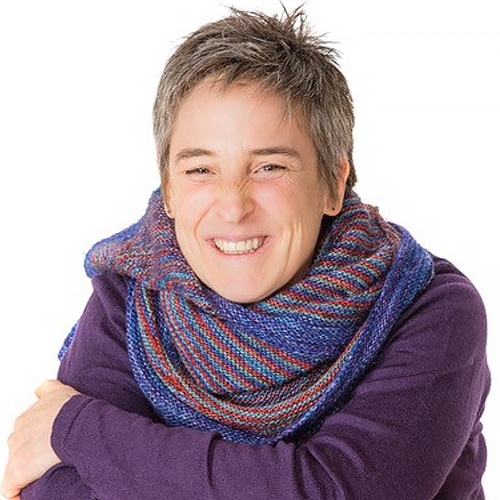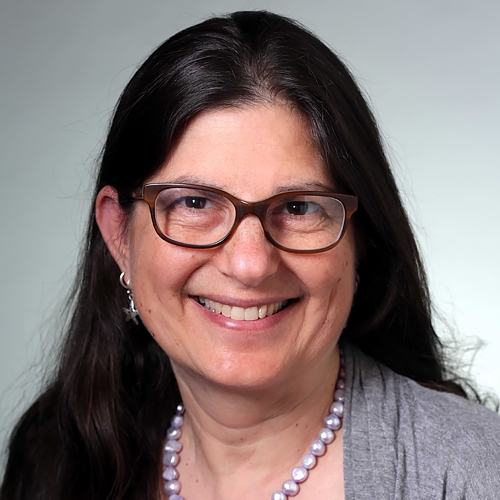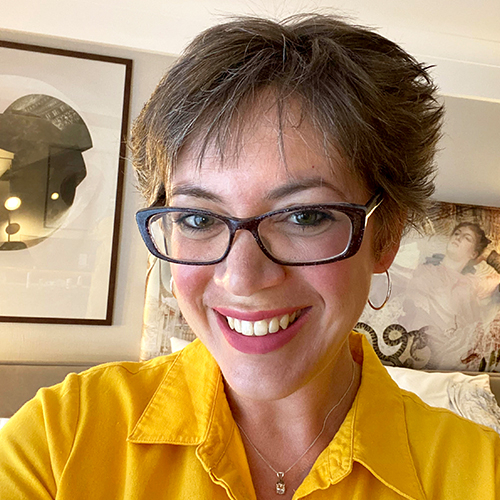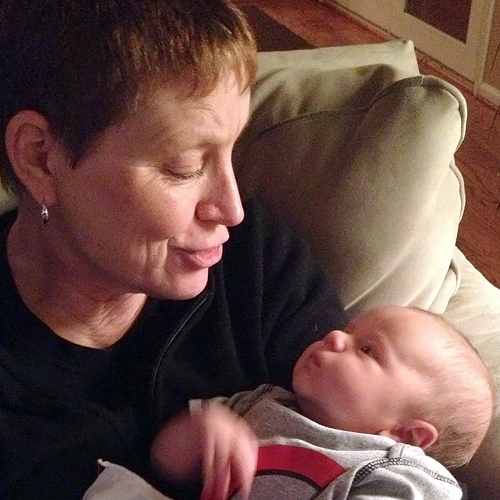Infant Sleep: Science and Social Factors
This series of lectures was originally presented at GOLD Learning Online Infant Sleep Symposium 2020.
Getting enough sleep is one of the most common concerns for new parents, and questions about sleep are common for all health care professionals working with new families. Stay up to date with the latest research and recommendations with Infant Sleep: Science and Social Factors!


Helen Ball trained in Human Biology and Biological Anthropology, obtaining her PhD at the University of Massachusetts, Amherst in 1992. She established the Parent-Infant Sleep Lab at Durham University in 2000, was promoted to Professor in 2007 and served as Head of the Anthropology Department 2013-2016.
Her research examines the sleep ecology of infants and their parents including attitudes and practices regarding infant sleep, behavioral and physiological monitoring of infants and their parents during sleep, infant sleep development, and the discordance between cultural sleep preferences and biological sleep needs. She conducts research in hospitals and the community and contributes to national and international policy and practice guidelines on infant care.
In 2016 she was appointed as Chair of the Scientific Committee for the Lullaby Trust, and in 2018 Durham University received the Queen’s Anniversary Prize for Further and Higher Education for Helen’s research and outreach work. She is a Board Member of ISPID (the International Society for the Study and Prevention of Infant Deaths) and directs the Durham Infancy & Sleep Centre (DISC) and Baby Sleep Information Source (Basis).
Topic: How do Digital Age parents cope with their infants at night? - [View Abstract]
Objective 1: Explain the different types of baby box scheme and their pros and cons.
Objective 2: Critically evaluate the claims made about baby box schemes and safe infant sleep.
Objective 3: Describe the impact of baby boxes on breastfeeding and mother-baby interaction.
Many assumptions exist about the origins and purpose of baby-boxes and their use as a safe infant sleep space; this misinformation needs correcting, especially as it relates to SIDS-reduction. Baby-box schemes take multiple forms from those motivated by social welfare to those motivated by commercial profit. Programmes offering carboard baby boxes to parents in England began in some NHS Trusts in 2016. We examined the pros and cons of English baby-box schemes via an independent evaluation conducted using telephone interviews and online surveys with healthcare providers and parents in all 7/9 NHS regions of England where baby-box schemes were established 2017-2019. The objectives were to produce recommendations for organisations considering involvement in future schemes. We found baby-box schemes changed over time, and were complex to run and monitor. Both parents and practitioners were misinformed about their purpose and origins. The English experience of partnership schemes between healthcare facilities and commercial box-providers reveals some success stories, along with multiple points of ambiguity, unanticipated difficulty, and concerns for infant safety. Sixteen recommendations are proposed for healthcare providers and organisations considering commercial - health-provider baby-box partnerships in future.


Erin is a Parent Educator in Ottawa, Canada and the mother of four young adults, including twins. After working in the area of community mental health as a Registered Social Service Worker, she jumped into Prenatal and Parenting education with the Ottawa Childbirth Education Association where she has been designing and providing classes for expectant parents, grandparents, and families expecting multiples for the last 20 years. She divides her time between teaching a class called Bringing Baby home to expectant parents, Normal Infant Sleep classes and working as a Postpartum Doula. In 2018 she returned to school to complete her M.ed for Healthcare Professionals.
Objective 1: Describe the factors that undermine the new parents confidence and lead to the belief that they must sleep train.
Objective 2: List the leading sleep concerns that parents present to their health care providers.
Objective 3: List strategies for educating and supporting new parents before and after birth.
Parents experience a lack of formal and informal education on normal newborn sleep patterns. This absence of information through group prenatal classes or perinatal appointments with healthcare providers results in unrealistic expectations of life with their newborn. Coupled with geographic isolation from extended family support systems or extended family members who have different recollections of newborn sleep patterns, parents turn to crowdsourcing information on social media. The prolific advertising of sleep training on social media platforms increases parental fear, leaving parents overwhelmed with the increasingly contradictory information on sleep and strategies for coping.
This presentation will address the situations that lead to unsafe bed sharing and social pressure to sleep train. Participants will have an understanding of the concerns that parents bring to sleep classes for both infants and toddlers. Collaborative strategies for responsive nighttime parenting that respects brain development; attachment theory, nighttime feeds, and balanced with parents need for sleep and self-care will be the focus. Opportunities for education that include online, individual and group opportunities will be offered including a collaborative effort between parents, family, community and healthcare providers.


Melissa Bartick, MD, MSc, FABM works as a hospitalist at Mt. Auburn Hospital in Cambridge MA, is an internist and is an Assistant Professor in Medicine at Harvard Medical School. She has numerous breastfeeding publications in peer-reviewed journals. She served as the chair of the Massachusetts Breastfeeding Coalition from 2002 to 2014, where she was also a founder of Ban the Bags. She served on the Board of Directors of the United States Breastfeeding Committee from 2009-2015. She has served on the Board of the Academy of Breastfeeding Medicine since 2019, where she has coauthored clinical protocols, including the 2020 Bedsharing and Breastfeeding protocol. She was founder of the Breastfeeding Forum of the American Public Health Association, where she served two terms as chair. She is founder and co-chair of her state’s Baby-Friendly Hospital Collaborative. She has blog contributions to the Huffington Post, the WBUR CommonHealth Blog, among others. Dr. Bartick received her BA from the University of Virginia and holds an MSc in Health and Medical Sciences from University of California, Berkeley and an MD from University of California, San Francisco. She works as a hospitalist at Mount Auburn Hospital and is the mother of two grown sons. As of June 2020, she is pursuing an MPH at Harvard School of Public Health.
Topic: Missing the Evolutionary Boat: How Viewing Infant Sleep Out of Context Fails Parents and Children - [View Abstract]
Objective 1: Describe the normal sleep patterns of breastfeeding dyads.
Objective 2: Describe the circumstances in which bedsharing might be hazardous.
Objective 3: Explain strategies for counseling parents on safe sleep.
Bedsharing promotes breastfeeding, but many authorities recommend against bedsharing for all mothers, citing safety concerns, particularly risk of sudden infant death syndrome or suffocation risks. Here we will review the normal physiology of mother-infant sleep, and the historical context in which such recommendations evolved. In addition, many populations have high rates of bedsharing with low rates of death. In this context, we will review the evidence around bedsharing and the most current evidence-based recommendations. Some risk factors for SIDS are more powerful than others, and we will review the best ways to minimize such risks, including a social-determinants of health approach. In some circumstances, bedsharing may carry particular risks and it is important to be able to discuss these issues with parents without stigma. We will discuss counseling of all parents in the “risk-minimization” approach, which would also allow for promotion of breastfeeding.


Lyndsey is an experienced paediatric nurse, children’s public health nurse, International Board Certified Lactation Consultant, Holistic Sleep Coach, researcher and responsive parenting advocate. She has worked in hospitals, clinics, the community and within clients’ homes for 20 years, serving within the UK NHS, in private practice and voluntarily.
The co-founder and clinical director of the Holistic Sleep Coaching program, Lyndsey regularly teaches internationally, as well as providing mentorship for newer sleep coaches. She is passionate about responsive feeding, gentle parenting and promoting parental confidence and well-being.
With Professor Amy Brown, she is the co-founder of Thought Rebellion – an education and publishing company seeking to inspire, challenge and equip professionals and writers in the parenting, lactation and perinatal space with an evidence based revolution.
Lyndsey is currently a PhD researcher at Swansea University, exploring the needs and challenges of medically complex breastfed infants and children. In 2019 she set up the Breastfeeding the Brave project to raise awareness of the unique breastfeeding needs of chronically, critically, and terminally ill children in the paediatric setting. The mother of a childhood cancer survivor, she often talks about the impact of chronic serious illness on families, and seeks to support other families living through a serious childhood illness.
Lyndsey is a respected international speaker and teacher, and regularly speaks out against the dominant sleep training culture, as well as advocating for the rights of families to receive high-quality, compassionate and expert support. She is the author of Holistic Sleep Coaching (2018), Let’s talk about your new family’s sleep (2020), Still Awake (2021), Breastfeeding the Brave (2022) and co-author of The Writing Book (2022).
Topic: Breastfeeding Children with Cancer - [View Abstract]
Topic: More Support in a Coffee Shop Than in the Hospital: Experiences of Breastfeeding Children With Medical Complexity - [View Abstract]
Topic: Supporting Families With Sleep While Optimising Attachment and Responsive Feeding - [View Abstract]
Topic: You Can't Sleep With Your Foot On The Gas Pedal: How To Improve Sleep By Tapping Into Calm - [View Abstract]
Objective 1: Explain the key principles of basic sleep biology.
Objective 2: Describe the importance of homeostasis in regulation.
Objective 3: Explain the role of stress in regulation.
Objective 4: Describe the relationship between the autonomic nervous system and sleep.
Objective 5: Explain how responsive, attuned care leads to less dysregulation.
Objective 6: Discuss how to facilitate parents to be calm, confident and connected to improve sleep.
Many parents become frustrated by their child's sleeping patterns. They may try to implement sleep schedules, or sleep training in an effort to try to manage their fatigue. However, understanding how sleep fundamentally works can not only optimise sleep, but also reduce parental frustration, improve connection, and increase confidence. Sleep occurs best in a non-stress state - therefore utilising strategies that increase child stress levels is likely to be counter-productive. Equally, experiencing stress for any reason may reduce the ease with which we can support sleep. This presentation discusses a holistic approach to supporting optimal regulation, attachment, emotional connectivity and naturally optimised sleep.


Karen Kerkhoff Gromada, MSN, RN, IBCLC, FILCA has been an IBCLC since 1991 and has worked as an IBCLC in both private practice and hospital settings. She also has experience as an adjunct clinical instructor for the University of Cincinnati College of Nursing and as a staff nurse in labor and delivery, childbirth education and postpartum discharge nursing care. Gromada was accredited as a La Leche League (LLL) Leader in 1975 and formed the first LLL group for mothers of multiples after the birth of her twin sons. The experiences of the group’s mothers provided the basis for her book Mothering Multiples: Breastfeeding and Caring for Twins or More. Her numerous articles and chapters about breastfeeding multiples have been published in professional and lay publications. A former International Lactation Consultant Association (ILCA) president (1994-96), she was designated Fellow of the International Lactation Consultant Association (FILCA) in 2008.
Objective 1: Describe the bio-psycho-social factors that affect sleep routines for multiple-birth infants and their parents.
Objective 2: Explain current infant sleep recommendations with related benefits, risks and barriers to implementations with multiple infants.
Objective 3: Describe strategies to meet the needs of each multiple-birth infant and each parent..
Sleep deprivation and disruption of an individual’s circadian patterns in the postnatal period are frequently cited as contributing factors in the development of postpartum depression, anxiety (PPD&A) or postpartum post-traumatic stress symptoms (P-PTSS). These factors are increased for the birthing parent of twins, triplets or more, who is more likely to bring two or more newborns home after experiencing perinatal complications and related interventions, and infants’ preterm birth, low birth weight and other complications, often resulting in neonatal intensive care unit stays. Even for a relatively ideal multiple pregnancy and birth, caring for two or more newborns – each having as many needs as any single-birth newborn – round-the-clock parenting generally leads to profound and often long-term sleep deprivation. When significant sleep deprivation affects a parent’s daytime behavior, all family members are affected. Yet current “safe sleep” recommendations or nighttime strategies promoting better sleep for parents and a single infant, including safer bedsharing techniques, are more difficult logistically to implement. These recommendations and strategies may also be less safe to implement with multiple infants. This session will examine the factors contributing to disruptive sleep for parents of multiples and develop strategies that meet both infants and parents needs for adequate sleep.
Accreditation
CERPs - Continuing Education Recognition Points: GOLD Conferences has been designated as a Long Term Provider of CERPs by the IBLCE--Approval #CLT114-07. This program is approved for 5 R-CERPs.
If you have already participated in this program, you are not eligible to receive additional credits for viewing it again. Please send us an email to [email protected] if you have any questions.
Tags / Categories
(IBCLC) Psychology, Sociology, and Anthropology, Infant Sleep
How much time do I have to view the presentations?
- The viewing time will be specified for each product. When you purchase multiple items in your cart, the viewing time becomes CUMULATIVE. Ex. Lecture 1= 2 weeks and Lecture Pack 2 = 4 Weeks, you will have a total of 6 weeks viewing time for ALL the presentations made in that purchase.
- Time for viewing the talks begins once you purchase the product. For Live Webinars & Symposiums, the viewing period begins from when the live event takes place. Presentations can be accessed 24/7 and can be viewed as many times as you like during the viewing period.
What are bundled lectures?
- Presentations may be available individually or via a bundled package. Bundled lectures are a set of lectures that have been put together based on a specific category or topic. Some lectures will be available in both individual and lecture form, whereas others will be available only via a bundled lecture pack.
Will there be Handouts?
- YES! Each lecture comes with a PDF handout provided by the Speaker.
Some lectures include a Q&A, what does that mean?
- During our online conferences, presentations that occur live are also followed by a short 15 minute Question & Answer Session. The Speaker addresses questions that were posted by Delegates during the presentation. We include the recording of these Q&A Sessions as a bonus for you.
How can I receive a Certificate?
- If this presentation offers a certificate, once you are done viewing the lecture or the lectures within a bundle, submit your attendance record in order to be able to download your certificate. You'll be able to see which credits are offered for the lecture by hovering over the "Credits Available" link within the "Speakers & Topics" tab.
Professionals that selected this package also viewed

|
|

|









